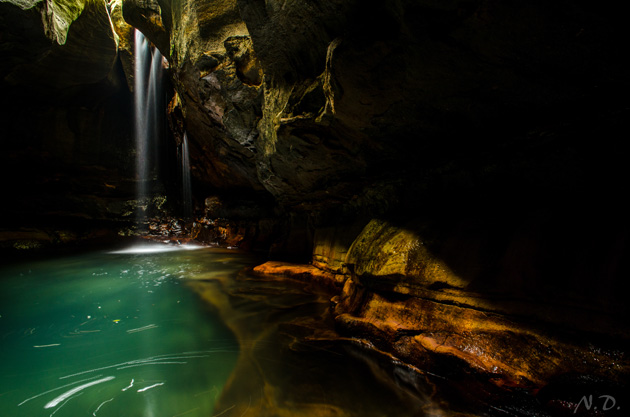26 metres below you, the emerald water sparkles in the sunlight. Vine tendrils pitch themselves over the edge of the hole, reaching down to touch the water, and waterfalls tumble down the rock faces in misty veils of spray. The surrounding jungle buzzes in its tropical warmth, and the stairway curling around the hole’s stone walls to the water’s edge offers a singular invitation – Dive in!
You’re at Il Kil on Mexico’s Yucatan Peninsula, one of the world’s many spectacular swimming holes. This one is formed by a cenote or collapsed limestone cave that exposed the crystal groundwater beneath. It’s a place of sublime beauty. (In fact, such is its setting that it was a stop on the 2010 and 2011 Red Bull Cliff Diving World Series, of which arena was a co-sponsor).
Swimming holes are nature’s way of combining pristine water with stunning backdrops to give outdoor and water lovers an experience that tantalizes and heightens your senses. There’s just something about swimming in a natural pool in a natural setting – it’s thrilling, liberating, daring, calming, inspiring, dreamlike, … not to mention invigorating and refreshing, given the bracing temperatures of some of them.
They’re not all cenotes like Il Kil. They could be hollowed-out pools at the base of a waterfall, like the Grand Canyon’s Havasu Falls, an inlet from the ocean like Jamaica’s Blue Lagoon, a natural spring like the River Loue at Mouthier-Haute-Pierre, France, hot springs like Pamukkale in Turkey, outlets for underground aquifers like Namibia’s Crystal Pools, disused quarries such as Dorset Quarry in Vermont, or simply a natural river pool like Willamette National Forest’s Opal Pool in Oregon.
There’s also no shortage of evocative swimming hole names, such as Italy’s Grotta della Poesia (Grotto of Poetry) in Apulia, Zambia’s Devil’s Armchair atop the ridge of Victoria Falls, the world’s highest waterfall, God’s Bath in California, Devil’s Punch Bowl in Colorado, and Palau’s Jellyfish Lake. You’ll have noticed the exotic locations as well – the list goes on: Iceland, Hawaii, Thailand, the Bahamas, Samoa, Belize, Japan, Laos, the Philippines, Azores, …
In many places, such is the attraction of the swimming hole that have become destinations in and of themselves, and their popularity among nature and water lovers has spawned active communities sharing their “finds”. For example, check out www.swimmingholes.org for a growing list of personal favourites in the US, as well as other parts of the world. Then there’s www.wildswimming.co.uk, which also has a section on France.
But for the sheer excitement of discovery and the sense that you’re a pioneer of sorts, there’s something special about finding your own swimming hole, whether it’s on your local river or on a trip far from home. For me, the nameless spring bubbling up from the underground aquifer in the remote dusty reaches of Damaraland in northern Namibia, will forever be etched in my memory. In the baking heat, the sharp freshness of the water’s shimmering welcome erased the day’s hardships and my parched throat, as the blazing sun set in the desert silence.
This is precisely what swimming holes are all about – the setting, the moment, the sensation.
So what are you waiting for? Go find your own.
